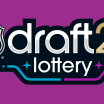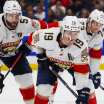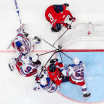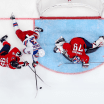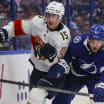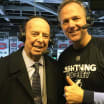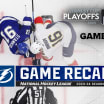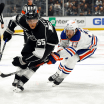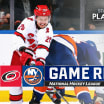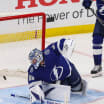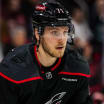NHL.com is providing in-depth analysis for each of its 30 teams throughout August. Today, the biggest reasons for optimism and the biggest questions facing the New York Rangers.
The New York Rangers have trended in the wrong direction the past two seasons. They went from reaching the Stanley Cup Final in 2014, to the Eastern Conference Final in 2015, to losing in the first round last season. It's fair to say the window to win the Cup is closing for the Rangers, who advanced to at least the conference final three times in four seasons from 2012-15.
New York has qualified for the Stanley Cup Playoffs six straight seasons, and much of the core of those teams remains, including goalie Henrik Lundqvist. They also added center Mika Zibanejad in a trade and signed free agent forward Jimmy Vesey. But playing in the tough Metropolitan Division, which had five teams make the playoffs last season, will they be able to keep the postseason streak alive?
Reasons for optimism, questions facing Rangers
Play of newcomers Jimmy Vesey, Mika Zibanejad will help determine New York's success
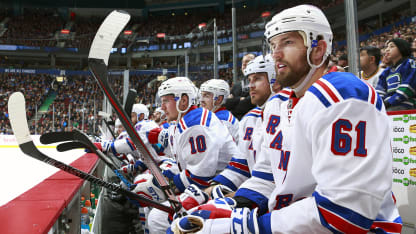
© Jeff Vinnick/Getty Images
Rangers 30 in 30: Season outlook | Top prospects | Fantasy outlook
Here are four reasons for optimism entering the season:
1. Welcome to Broadway, Jimmy Vesey
The Rangers weren't too flashy this offseason, acquiring Zibanejad from the Ottawa Senators for center Derick Brassard and making some depth moves. But that changed Friday when Vesey, the 2016 Hobey Baker Award winner from Harvard University, agreed to a contract with New York.
Vesey became an unrestricted free agent at 12:01 a.m. Tuesday and met with seven teams before deciding to play for the Rangers. The Nashville Predators, who selected Vesey in the third round (No. 66) of the 2012 NHL Draft, traded the 23-year-old to the Buffalo Sabres on June 20 after failing to sign him. The Sabres had exclusive negotiating rights with Vesey from the time of the trade through Monday but also were uanble to sign him.
Vesey had 56 goals and 48 assists in his final two seasons at Harvard and should make an immediate impact on the Rangers offense, no matter what line he plays on.
"There's no guarantees in sports obviously, but I feel that New York is somewhere that I can plug in right away and play and hopefully stick in the NHL," Vesey said. "It's obviously not just going to be given to me; I'm going to have to put in the work and perform on the ice. But I thought New York was somewhere that I could plug in right away and be on the opening night roster."
2. Extended time off
If there was a positive for the Rangers in losing to the eventual champion Pittsburgh Penguins in five games in the first round, it was getting a longer summer to rest, regroup and recharge for this season. Since 2011-12, New York has played 81 playoff games, the most in the NHL; that means the Rangers essentially have played an extra full season. Playing deep into May and June is the ultimate goal, but they have nothing to show for it and the extended rest surely is appreciated by the veterans of the group, including Lundqvist (34 years old), defenseman Dan Girardi (32) and forward Rick Nash (32).
"We've been fortunate to have some pretty long runs, obviously, not successful as we want to be," captain Ryan McDonagh told NHL.com last month. "It's not a good feeling to lose in the first round in five [games] the way we did. That's the biggest motivation, kind of that feeling of embarrassment and letting your teammates down, letting your organization down, letting the fans down that appreciate us and watch us all year. So, like I said, I'm really anxious to hopefully see a lot of hard work from the guys paying off this year."
3. Improvement on the penalty kill
The Rangers ranked 26th on the penalty kill (78.2 percent) last season, allowing at least one power-play goal in 41 regular-season games. Pittsburgh scored eight power-play goals (at least one per game) in the first-round series. To improve the PK, New York added Zibanejad, who had two shorthanded goals and was third among Ottawa Senators forwards in shorthanded ice time per game last season (1:25); Michael Grabner, who was second among NHL forwards in shorthanded ice time per game (3:06) and had 12 shorthanded takeaways last season, and has 12 career NHL shorthanded goals; forwards Josh Jooris and Nathan Gerbe; and defenseman Nick Holden (2:20 of shorthanded ice time per game last season).
"There's no secret our penalty-killing was not good, and some of the moves we made, if not all of them, have had some part in that," general manager Jeff Gorton said. "We have to be better there. When we got a guy like Grabner or Gerbe, or to add Jooris or Holden … and now Zibanejad, yeah, that's a significant part of the game now, and for us to be in the top of the League is important.
"That's something we strive for and it didn't happen [last season], and I think it says so in all the moves that we made."
4. Henrik Lundqvist not slowing down
Lundqvist, who will turn 35 on March 2, has been one of, if not the, most consistent goalies in the League for the past decade. He was 35-21-7 with a 2.48 goals-against average and .920 save percentage last season, and has at least 30 wins in each of his 10 full NHL seasons. Last season, he allowed two goals or fewer in 39 starts. Lundqvist was named the Rangers' most valuable player in seven straight seasons from 2006-13 and gives them a chance to win on a nightly basis.
Here are three key questions facing the Rangers:
1. How will Mika Zibanejad fit in?
The Senators traded Zibanejad and a second-round pick in the 2018 draft to the Rangers for Brassard on July 18. Zibanejad plays in all situations, takes faceoffs and likely will be the first-line center. But how he adjusts to wherever he plays is crucial.
"He's just scratching the surface at age 23," Gorton said. "There's not a lot of guys that have done what he's done as far as score 20 before that age. He kills penalties. He's really emerged on the draws. Since he's come in, he's got better every year, and I think we're just scratching the surface."
Zibanejad averaged 17:45 of ice time per game, including 2:30 on the power play and 1:25 shorthanded, last season. He also led the Senators with 1,306 faceoffs taken and 659 faceoff wins (50.4 percent).
"The ability to get him, to get a younger player, to get a guy that's fast, big, plays real well in his own zone, can do a lot of things for us, that's the exciting piece," Gorton said.
2. Will special teams be better?
New York failed to win a playoff round last season for the first time since 2010-11, and a big reason was because of its struggles on the penalty kill. The Rangers ranked in the bottom five in the League (78.2 percent) during the regular season. During the previous two seasons, when they made the Cup Final and conference final, they ranked third and sixth, respectively.
The Rangers ranked 14th on the power play (18.6 percent) last season. Losing their top two power-play point-producers and three of their top five from last season won't help. Brassard and defenseman Keith Yandle, who was traded to the Florida Panthers, led the way with 22 points each with the man-advantage. Defenseman Dan Boyle, an unrestricted free agent, was fifth with 10 points. Mats Zuccarello (18 points) and Derek Stepan (10 points) were the other Rangers to score at least 10 power-play points.
More production will be counted on from forwards Chris Kreider, Kevin Hayes and Nash, who had four goals and six power-play points in 60 games after he had six and 12 in 79 games in 2014-15.
3. How many games will Henrik Lundqvist play?
Lundqvist is second among active goalies in NHL wins (374) behind Roberto Luongo of the Panthers (436). One of the most durable goalies in the past decade, Lundqvist had the highest GAA of his NHL career (2.48) last season.
Lundqvist made 64 starts last season and has started 81 playoff games over the past five seasons. It would not be a stretch to say 27-year-old backup Antti Raanta, who went 11-6-2 last season, will start more games than he did last season.
